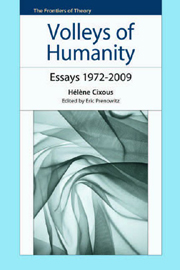Book contents
- Frontmatter
- Contents
- Sources
- Series Editor's Preface
- Introduction: Cixousian Gambols
- 1 Fiction and Its Phantoms: A Reading of Freud's Das Unheimliche (The ‘Uncanny’)
- 2 The Character of ‘Character’
- 3 Missexuality: Where Come I Play?
- 4 The Pleasure Reinciple or Paradox Lost
- 5 Reaching the Point of Wheat, or A Portrait of the Artist as a Maturing Woman
- 6 Letter to Zohra Drif
- 7 The Names of Oran
- 8 The Book as One of Its Own Characters
- 9 How Not to Speak of Algeria
- 10 The Oklahoma Nature Theater Is Recruiting
- 11 The Book I Don't Write
- 12 The Unforeseeable
- 13 Passion Michel Foucault
- 14 Promised Cities
- 15 Volleys of Humanity
- Acknowledgements
- Index
9 - How Not to Speak of Algeria
Published online by Cambridge University Press: 12 September 2012
- Frontmatter
- Contents
- Sources
- Series Editor's Preface
- Introduction: Cixousian Gambols
- 1 Fiction and Its Phantoms: A Reading of Freud's Das Unheimliche (The ‘Uncanny’)
- 2 The Character of ‘Character’
- 3 Missexuality: Where Come I Play?
- 4 The Pleasure Reinciple or Paradox Lost
- 5 Reaching the Point of Wheat, or A Portrait of the Artist as a Maturing Woman
- 6 Letter to Zohra Drif
- 7 The Names of Oran
- 8 The Book as One of Its Own Characters
- 9 How Not to Speak of Algeria
- 10 The Oklahoma Nature Theater Is Recruiting
- 11 The Book I Don't Write
- 12 The Unforeseeable
- 13 Passion Michel Foucault
- 14 Promised Cities
- 15 Volleys of Humanity
- Acknowledgements
- Index
Summary
I get along well with the mysteries of the word sexuality and even gender (I get along with these words and these concepts in French, because for me, they live, work and create in the French language); however, in the face of the word nation I feel ill at ease, I am intimidated, uncertain. I can only feel implicated without reserve if I retain the semantic value of the word's Latin root: natio, birth. With Nation I am caught in the tension of two opposites: non-belonging and belonging.
I sense that the word Nation, the Latin word erected, glorified, enlarged to the political community by the French Revolution, remembers having once signified the tribe, the ethnic group. When I was a student in Algeria's French public schools, I sensed that I belonged neither to the Gallic tribe nor to my Arab kith and kin who, for their part, were excluded, or nearly so, from school. I sensed this because the entire class made me feel it. One day I must recount at length the psychic distortion, the split, the skhizein (schizo-), the guilt, the stigmata engraved into the unconscious minds of each of those schoolchildren and non-schoolchildren who were changed into structural impostors by the ambivalent and contradictory powers of the Master of Thought and Imagination called the French Republic. But another day my friends of Algerian nationality will also recount at length the incredible adventures that happen to them through language, or rather through languages, which are taken hostage, taken to court, regimented, and erected or abased according to whether their gender – or their sex? – is masculine or feminine.
- Type
- Chapter
- Information
- Volleys of HumanityEssays 1972–2009, pp. 160 - 176Publisher: Edinburgh University PressPrint publication year: 2011



